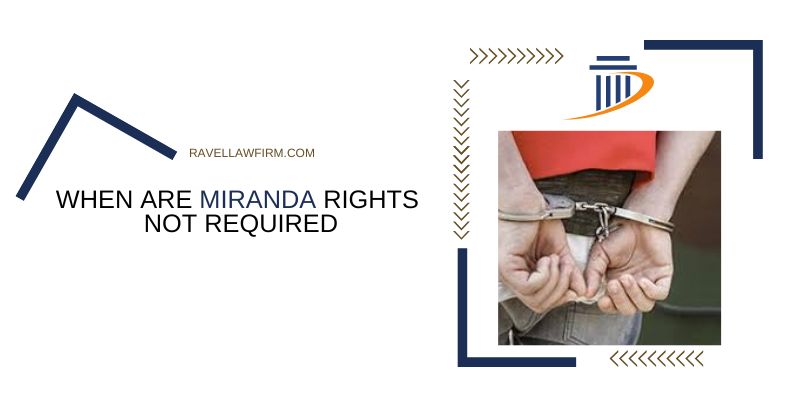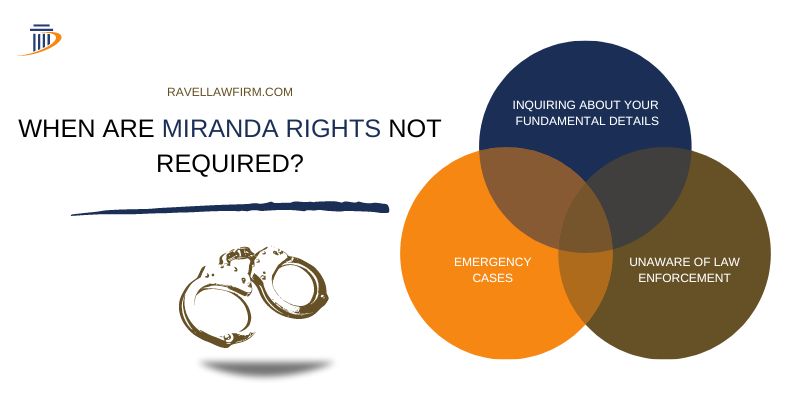Do you want to know your legal rights as a suspect? If yes, then this article is surely for you.
Accordingly, you (the suspect) have legal rights to remain silent and hire an attorney when you are in custody. This set of rules is called Miranda rights. But when are Miranda rights not required, and when are they required?
There are exceptions to Miranda rights in cases of primary details, emergencies, or when you are unaware of the officer. We’ve explained it in detail afterward in the article. So scroll ahead and know the exceptions to Miranda rights.

What are Miranda Rights?
In 1966, the US case of Miranda vs. Arizona gave the concept of Miranda rights. These are the constitutional rights of the citizens (suspects) to remain silent and hire an attorney for them.
Purpose of Miranda Rights
Accordingly, these rights can be considered a set of instructions that an officer gives suspects before questioning them. Through this set of rights, you (the suspect) are informed about their given rights:
- You can keep silent on any questions the officer asks. During questioning, whatever you say could be used as evidence against you.
- You have the right to hire an attorney to make presentations on your behalf and prepare strong arguments to prove you innocent. However, if you (the suspect) cannot afford to hire an attorney, then the government can provide a free-of-cost attorney to you.
You have the complete right to apply these rights at whatever stage you want. But I think you should use these rights earlier and remain silent because you don’t know what they can use against you. By staying silent, we also mean that you can refuse to answer any of their questions.
Also, it would be best for you to discuss what to say and avoid with your attorney. This way, you can expect your case to lead to a winning situation. Consequently, you could be in a safe place by applying all of your above legal rights.
Also Check: Charges Dismissed Vs Dropped
When are Miranda Rights not Required?
Typically, law enforcement officers are required to inform you of your Miranda rights at the outset of an interrogation. However, there are certain exceptions to this rule. So having this in mind, below we have listed the most common cases when Miranda rights are not required.

1. Emergency Cases
In case of any emergency, the officers can question you even without informing you about Miranda rights.
Let us take an example for you to understand, i.e., better, if the public or the government officers are in danger due to a recent terrorist attack. Then in this situation, the questioning officers have complete rights to investigate and get your answer without the need for Miranda rights.
In short, whatever statement you make under emergencies, could be used as evidence against you in court.
2. Inquiring about your Fundamental Details
There are also exceptions to Miranda rights when the police officers inquire about your identifying information like your name, address, contact number, etc.
In this situation, you can quickly answer them or say whatever you want without needing them to read the Miranda rights.
However, information other than your details could not be used as evidence against you if they have not informed you about Miranda rights. Boutique Law Firms are always good in guiding you about these situations.
3. Unaware of Law Enforcement
The Miranda rights apply to legal authorities such as a prosecutor, any law enforcement officer, etc., you may not be aware, but it could also serve as the case when Miranda rights are not required.
In this respect, if you confess anything to the legal officers when you are unaware that they are an officer, then Miranda rights will not be applicable. Because, according to this scenario, you didn’t know that the person interrogating you was a legal officer.
Also Read: What Is Inappropriate Marital Conduct
When is Miranda Required?
Now you have a clear idea about when Miranda rights are not required. So, if you’d like to know when Miranda is needed, please look at the section I’ve included.
1. When you are in Custody?
Law enforcement officers should have to read the Miranda rights to you if you are in custody. Such as when you are arrested officially or when you know that you are unable to leave.
In this situation, the officers will first let you know of your Miranda rights and then they will proceed to the questioning process.
2. When you are Interrogated?
The arresting officers must read your Miranda rights before you are interrogated. However, some officers do it even in the custodial situation, but it is rare.
Sometimes, they don’t inform you and you unconsciously confess the crime in front of the officer. Then your confession could be used as solid proof against you in court. That is why it could be helpful if the officers read the Miranda rights before the questioning.
What happens if a Police Officer doesn’t read Miranda Rights?
A misconception among the suspects is found regarding the drop of a case due to unawareness of Miranda rights. If so is the case with you, then you should clarify that it is nothing like it.
It means only to dismiss or drop your case if you are informed about Miranda rights. Although the case can’t be dropped, the statements collected from you can be used as robust evidence against you in court.
That is why you cannot avoid the possible penalties in this situation because it just reduces the possibility of your evidence and nothing else.

Hi, I’m Brian Gary; I have my Doctor of Juridical Science (SJD) degree from SMU Dedman School of Law in Dallas. Over the years, I have dealt with many families and successful corporate Legal cases. I have counseled many people on legal matters, and along with my profession, I write about Law on my blog. Please feel free to contact me for counseling/case discussion; I’ll be happy to help you.